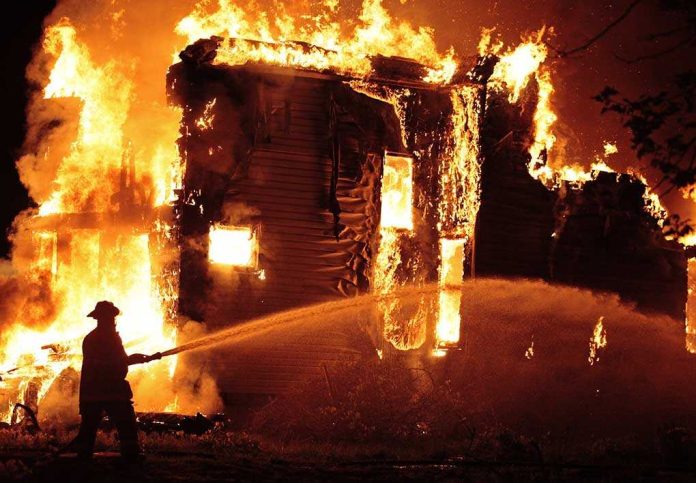
When a mother chooses the safety of her community over the bond with her own son, the boundaries of loyalty, morality, and justice are laid bare for all to see.
Story Snapshot
- A Florida mother reported her son to police after suspecting him of setting fire to a synagogue, leading to his arrest on hate crime charges.
- The crime occurred just before the Jewish High Holidays, intensifying the impact on the local Jewish community.
- Family intervention was decisive in stopping further violence and ensuring the suspect faced justice.
- The case highlights the growing threat of hate crimes and the essential role of family and community in prevention.
Mother’s Moral Dilemma: Family Loyalty Collides with Civic Duty
Police in Punta Gorda, Florida, received a tip they never expected—a mother, haunted by her son’s hateful rants and strange behavior, called in to report him as the likely arsonist behind the Chabad of Charlotte County synagogue fire. The drama unfolded days before Rosh Hashanah, a time traditionally marked by reflection and renewal in Jewish communities. What makes this case extraordinary is not just the crime but the mother’s decision to act, shattering the usual silence that often protects family secrets. Her choice speaks volumes about the burdens of conscience and the responsibilities Americans bear—not only to those they love, but to the communities they inhabit.
That night, Blake Richard Hoover left his home, a gas can disappeared, and he returned barefoot, clutching a spray paint can. The fire broke out at the synagogue around 10:50 p.m.—the building, recently converted from a library into a Jewish school and museum, now bore the scars of hate-fueled destruction. Coverage of the incident quickly made the local news, and Hoover’s mother, connecting the dots between missing items and her son’s escalating rhetoric, grew convinced of his guilt. Family anguish turned into action as she and her sister contacted police, providing the crucial tip that led to Hoover’s arrest just days later.
How Hate Festers—and How It’s Stopped
The accused, Hoover, had a documented history of anti-Semitic and homophobic tirades, including explicit threats against the synagogue. These weren’t idle words; they were warnings of intent. The family’s decision to break the code of silence reflects a growing recognition that hate crimes often germinate at the dinner table long before they erupt in public. Law enforcement, for their part, have emphasized the critical role families play in early intervention—often, it’s a mother, father, or sibling who sees trouble coming before anyone else. By acting, Hoover’s mother may have prevented further tragedy, not only for potential victims but perhaps also for her son.
Hoover now faces serious charges: arson, criminal mischief, and the possibility of enhanced penalties for hate crimes. He remains in custody without bond for arson, with a bond set for criminal mischief, as authorities investigate whether additional charges are warranted. The community, meanwhile, is left to reckon with the aftermath—heightened anxiety, increased security, and renewed debates over how best to protect vulnerable institutions from hate-driven violence.
Community Impact: Trauma, Resilience, and Policy Questions
The timing of the attack—on the eve of Rosh Hashanah—struck at the heart of the Jewish community’s sense of safety and belonging. The Chabad of Charlotte County has since reopened with new security measures, but the scars linger. For families in the community, the fear is not abstract: it’s immediate, personal, and often reinforced by the long shadow of similar attacks nationwide. Local leaders have called for solidarity and vigilance, echoing a broader movement among religious minorities to shore up defenses and demand law enforcement accountability.
Economically, the incident has imposed costs in repairs, security upgrades, and legal proceedings. Socially, it has heightened polarization, as hate crimes often do, by exposing the deep fissures that can run through even seemingly peaceful towns. Politically, leaders now face pressure to strengthen hate crime legislation and ensure that reporting mechanisms are accessible and effective—not just for victims, but for those who see warning signs within their own families.
Expert Analysis: Policy, Psychology, and Prevention
Hate crime experts point out that early intervention is often the difference between prevention and disaster. Sociologists studying such cases note the immense psychological toll on families who report loved ones—guilt, fear, and the stigma of exposure. Legal scholars, meanwhile, emphasize the complexities of prosecuting hate crimes, especially when intent must be proven to a high standard. Despite these challenges, the consensus is clear: family vigilance, community cooperation, and robust law enforcement response are essential for turning the tide against hate-driven violence.
For the Jewish community in Punta Gorda and across the country, the impact of this crime echoes far beyond the charred walls of a single synagogue. It’s a call to action—for families, for neighbors, and for policymakers. The lesson is stark: hate can grow in silence, but so can the courage to confront it, even when it means sacrificing the comfort of familial loyalty. In a nation built on both liberty and responsibility, the mother’s decision is a reminder that sometimes, the hardest choice is the right one.
Sources:
AOL News: Report: Mother turns in son she believes set synagogue on fire
Fox 4 Now: Punta Gorda Police: Mother feared son set synagogue fire after hateful rants
VIN News: Aunt’s tip leads to arrest in Charlotte County synagogue arson
CBS News: Punta Gorda Florida man synagogue arson hate crime Rosh Hashanah
Fox News: Suspect arrested in Florida synagogue arson hate crime, police









